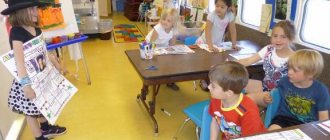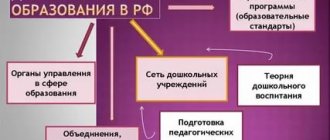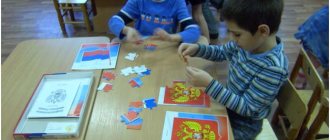Prospects for the development of the preschool education system within the framework of the Federal State Educational Standard
Nadezhda Koroleva
Prospects for the development of the preschool education system within the framework of the Federal State Educational Standard
Preschool education is the very first public-state form in which professional pedagogical work with the younger generation is carried out. Preschool is a sensitive period characterized by rapid changes in a child's cognitive abilities, physical, linguistic, social and emotional development . Positive experiences and the basis for successful development and learning laid at an early age create a solid foundation for the child's future development . This determines the sociocultural significance of preschool education .
Since 2013 “On Education in the Russian Federation” came into force
the federal state standard of preschool education ( FSES DO) approved by the Council of the Ministry of
Education , which reflects agreed upon socio-cultural and socio-state expectations regarding the level of DO, which are guidelines for the founders of preschool Organizations education system specialists , families pupils and the general public.The
methodological and theoretical basis of the Federal State Educational Standards for Educational Education were :
GEF DO is aimed at:
Objectives of the Federal State Educational Standard of Education :
protection and strengthening of the physical and mental health of children;
preservation and support of the child’s individuality, development
the individual abilities and creative potential of each child as a subject of relationships with people, the world and himself;
the formation of a general culture of students, the development of their moral , intellectual, physical, aesthetic qualities, initiative, independence and responsibility, the formation of prerequisites for educational activities;
ensuring variability and diversity of the content of educational programs and organizational forms of the level of preschool education, taking into account the educational needs and abilities of students;
the formation of a sociocultural environment that corresponds to the age and individual characteristics of children;
ensuring equal opportunities for the full development of each child during preschool childhood, regardless of place of residence, gender, nation, language, social status, psychophysiological characteristics (including disabilities)
;
ensuring continuity of basic educational programs of preschool and primary general education ;
identifying directions for systematic interdepartmental interaction, as well as interaction between pedagogical and public associations (including networking)
.
The key principle of the standard is to support the diversity of the child and , accordingly, the transition from selection diagnostics to developmental .
The basis of the content of preschool education is determined
5 directions, educational areas corresponding to the main lines of child development :
The text of the document does not use the word “occupation”
, but this does not mean a transition to the position of
“free education” of preschoolers . Adults will not stop working with children in Russian kindergartens. But this form of educational activity as an activity does not correspond to the age characteristics of preschool . In modern theory and practice, the concept of “activity”
is considered as an entertaining activity, without identifying it with occupation as a didactic form of educational activity.
The new document prioritizes an individual approach to the child and play, where the intrinsic value of preschool childhood is preserved and where the very nature of the preschooler . Since a preschooler is a person who plays , the standard stipulates that learning should enter the child’s life through the “gates of children’s play”
, namely through story games, including role-playing games, director's games and games with rules.
The fact that the role of play is increasing as the leading activity of a preschooler and that it is given a dominant place is certainly positive, since currently occupation comes first. And the need to abandon the educational and disciplinary model of the educational process (refusal from specially organized activities)
has long been overdue. The acquisition of valuable experience for the child is also assumed:
in motor activity, including basic movements (walking, running, jumping, climbing, etc., as well as when riding a scooter, sled, bicycle, skiing, in sports games;
in communicative activities (constructive communication and interaction with adults and peers, oral speech as the main means of communication);
in cognitive research activities (studying objects of the surrounding world and experimenting with them)
;
in elementary labor activity (self-service, household work, work in nature)
;
in the process of perception of fiction and folklore;
in the process of construction from various materials (building materials, construction sets, modules, paper, natural materials, etc.);
in visual arts (drawing, modeling, appliqué)
;
in musical activities (singing, musical-rhythmic movements, playing children's musical instruments).
The Federal State Educational Standard for Preschool Education implies that educational organizations of preschool education will independently develop and approve their main educational programs on the basis of the Federal State Educational Standard for Preschool Education and taking into account the approximate basic educational programs for preschool education , which will be compiled by experienced developers and placed in the federal register.
Unlike other standards, the Federal State Educational Standard for Educational Education is not the basis for assessing compliance with the established requirements of educational activities and training of students. The development of educational programs of preschool education is not accompanied by intermediate certifications and final certification of students.
If we talk about what is fundamentally new in the content of preschool education , then this is the obligation of its compliance with the principles stated in the Federal State Educational Standard :
developmental education , the goal of which is the development of the child ;
necessity and sufficiency (compliance with the criteria of completeness, necessity and sufficiency (allow you to solve set goals and objectives only on the necessary and sufficient material, get as close as possible to a reasonable “minimum”
);
integration of educational areas in accordance with the age capabilities and characteristics of students, the specifics and capabilities of educational areas ;
comprehensive construction of the educational process (to motivate educational activities, it is planned to use not a set of individual game techniques, but to ensure that children learn educational material in the process of preparing and conducting any events that are significant and interesting for them);
solving program educational problems in joint activities of adults and children and independent activities of children;
interaction with parents (parents must participate in the implementation of the program, in creating conditions for the full and timely development of the child in preschool age , so as not to miss the most important period in the development of his personality , i.e. they must be active participants in the educational process , participants in all projects, regardless of what activity dominates them, and not just bystanders).
Thus , we can say that an attempt is being made to transform the once unified system of “public preschool education ”
into a genuine
system of preschool education as a full and integral stage of general education . This means the actual recognition that a preschool needs not only guardianship and care, but also education, training and development .
In conclusion, I would like to note that the prospect of reforming preschool education gives hope for qualitative changes in this area. After all, the Federal State for Educational Education contains the following positive aspects:
1) the desire to make the life of children in kindergarten more meaningful and interesting;
2) creating conditions so that the teacher can take into account the developmental characteristics of each child , the interests of the group, the specifics of the national, cultural and natural geographical conditions in which the educational process ;
3) an attempt to influence the reduction and simplification of the content of education for preschool children by establishing targets for each educational area ;
4) refusal to copy school technologies and forms of educational organization;
5) the desire to form an initiative, active and independent child.
Materials used
1. Prospects for the development of preschool education . [Electronic resource] – Access mode: https://ds11.edumsko.ru/activity
/fgos/articles/perspektivy_razvitiya_doshkol_nogo_obrazovaniya#showall
2. Prospects for the development of the preschool education system within the framework of federal state standards. [Electronic resource] – Access mode: https://sch1018.mskobr.ru/files/perspektivy_razvitiya_sistemy
_doshkol_nogo_obrazovaniya_v_ramkah_federal_nyh_gosudarstvennyh_standartov.pdf
3. Draft Federal State Educational Standard for Preschool Education dated June 13 , 2013 and July 7, 2013.
4. Fedina N.V. Psychology of education in a multicultural space. – 2010. – Volume No. 1.
Wheel of Values
— What exactly is your educational system based on?
— In our work we proceed from the unity of eight directions. This is a kind of wheel of values, where every spoke is needed. For example, one of our key areas is friendship, the next is family. Of course, these are completely different types of values, but there is something that unites them: human relationships. Social psychologists say that 80 percent of happiness depends on how people communicate with each other.
Or, for example, the topic of children's health is important to us. Related to this topic is the value of proper nutrition, since even a small child should understand which foods are harmful and which are beneficial. The value of physical development and sports is important. Remember how in Ancient Greece everyone was an athlete and constantly trained. As they say, a healthy mind in a healthy body. The child must be physically developed, this is very important. But what confuses me is this: when children get to primary school, what happens to them? They begin to wear huge, heavy backpacks, constantly sit at their desks, and move little - this not only spoils their posture, but also leaves consequences for life, and their physical health is destroyed. For what?
Another value is creativity. Moreover, I consider musical development to be a priority. If you look at the high society of the Russian Empire, and other countries, playing musical instruments was not considered something outstanding. In old films, anyone could sit at the piano and play any piece. This is important because it creates a certain aesthetic perception of the world. When a person hears classical music, he is spiritually filled. He notices beauty. He has both hemispheres working. He's more balanced.
Responsibility, the ability to answer for one’s actions, is another of our values. Today, many children, when they do something, say: “Oh, it wasn’t me who did it, it was someone else.” And from early childhood we develop the skill: if you scatter the toys, let’s go collect them. You offended - let's go figure it out and ask for forgiveness. In adult life, some also throw up their hands: “I called but didn’t get through.” This is irresponsibility. Or they complain: “Nobody liked my presentation.” What have you done to improve it? This is a position of responsibility when you have to step over yourself in something.
Therefore, the next value is the search for knowledge. Children should be taught the skill of self-development. It is not knowledge that makes a person a person, but the search for knowledge. You don’t need to say “I don’t know,” but you need to think where to find out, who to ask, who to consult. You don't have to be smarter than everyone else. It's okay not to know everything. Yes, this is not required. Today it is enough, for example, just to have a smartphone. But a person must not only find new knowledge, but, most importantly, be able to apply it in life.
And finally, etiquette, manners, rules of behavior in society. Now they like to say: “This is my character.” But actually, tell me, what is it called?
- Bad manners.
- Exactly. There are people who don't say hello at all. Abroad they say: “We know that you are Russian because you don’t say hello.” But it’s normal to smile and say hello, it’s good manners. It seems to me that we are the only nation that is happy that we had a good holiday in another country, if there were no Russians nearby. Today many children are embittered; they do not know how to behave with their elders. Try to walk past the school or go to the playground - you can generally hear swearing there. And we must be continuers of real Russian traditions.
— How do you understand this, considering that Russia is a multinational country?
- We do not connect this with nationality. An Uzbek, a Kazakh, or a Frenchman can be a continuer of Russian traditions. This is any person who lives in Russia, accepts its history, shares the values and culture of our country. All over the world they talk about Russian literature, Russian ballet, Russian artists, musicians, scientists. But we are no longer the heirs of the Russian Empire, because over the past hundred years our country has been destroyed three times. Now we live in another country, which is very young. Of course, we have a responsibility to create new authorities, but we must not forget about the legacy. It's all ours anyway. We must analyze, for example, how did it happen that in the Russian Empire the nineteenth century produced a golden generation? It was not genetics, but technology that we can easily repeat.
— And how do you think this technology can be replicated?
— I’ll give you a sports example, because sport is always measurable. There is a goal, certain indicators, and there are no first few places. In the nineties, the Belgian national football team was ranked below 100th. Today it is a gold team, the most expensive in the world. But most people believe that the stars just aligned. No, this is pure technology. Coach Michel Sablon, who reformatted Belgian football and brought it to the world level, began working not with adult football players of the current national team, but with children's and youth schools. He noticed that even six-year-old children played big football, breaking into teams of eleven people, on a huge field. As a result, the average child touched the ball for only two minutes in ninety minutes. This was initially an incorrectly organized training process. How can children be virtuosos with the ball when they can't see it? At an early age, it is much more important to master not the tactical knowledge, but the technical side. Sablon's idea was to have children constantly interact with the ball. First, they learned to play in teams of two on a small field, then the field was enlarged and the number of players expanded to six, eight, and so on. Today these children, the same Eden Hazard, Thibaut Courtois or Kevin de Bruyne, are the best football players in the world. In my opinion, the entire educational process can be reformatted in a similar way. This will not require a hundred years; just a generation change of fifteen to twenty years is enough.
Smile Fish



